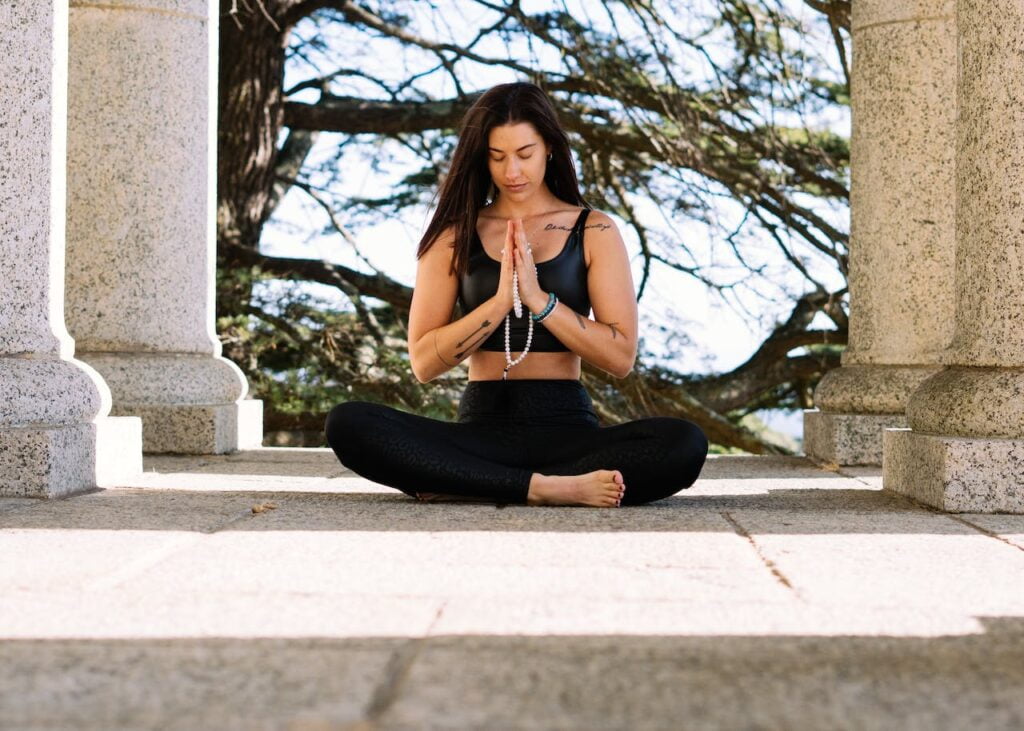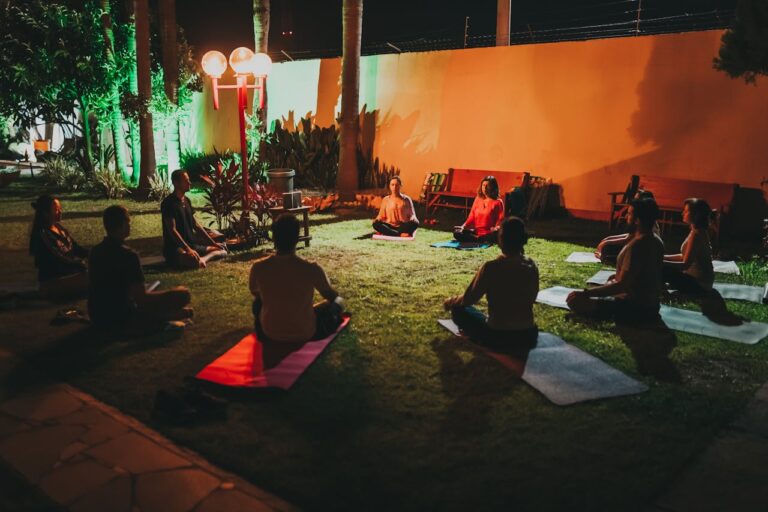Vipassana Meditation

By Temple of Umi

Table of Contents
Explore the enriching world of Vipassana meditation and its community. Dive into the benefits, support networks, and guidance from mentors to transform your practice and life. Embrace the journey towards inner peace and enlightenment with our comprehensive guide.
Introduction
Vipassana Meditation: A Path to Inner Tranquility and Awareness
Vipassana Meditation is a profound practice aimed at achieving deep self-awareness and purifying the mind from impurities through introspection and mindfulness. Originating from the time of Gautama Buddha over 2,500 years ago, Vipassana has traversed centuries, maintaining its essence while spreading across cultures and borders. This ancient technique, meaning “to see things as they are,” has found a place in contemporary life, offering solace and clarity in a world often marked by chaos and distraction.
Historical Roots and Global Spread
The journey of Vipassana Meditation from the quiet corners of ancient India to the bustling cities of the modern world is a testament to its timeless relevance. Taught originally in Pali, the language of Buddha, Vipassana, was preserved in the Theravada Buddhist tradition. In the 20th century, figures like S.N. Goenka played a pivotal role in introducing Vipassana to a global audience, establishing centers worldwide where individuals from all walks of life could learn and practice.
The Significance of Vipassana in Contemporary Life
In today’s fast-paced world, Vipassana offers a sanctuary for the mind. Its principles help individuals navigate life’s challenges with serenity and insight, fostering a profound connection to the present moment and a deeper understanding of the self and others. Vipassana’s growing popularity underscores a universal quest for peace, mental clarity, and a more meaningful existence.
Understanding Vipassana Meditation
What is Vipassana Meditation?
Vipassana Meditation is a technique of mental purification through self-observation. At its core, it focuses on the breath and bodily sensations, witnessing the impermanent nature of thoughts and feelings without attachment or aversion. This practice cultivates balanced mindfulness, enhancing self-awareness and liberation from suffering.
Core Principles and Practices
- Mindfulness of Breath: Practitioners develop concentration and awareness by using the breath as an anchor to the present moment.
- Observation of Sensations: Attention is systematically moved through the body, noting sensations without judgment. This practice cultivates stability and insight into the impermanent nature of all phenomena.
- Metta (Loving-kindness): Vipassana incorporates the practice of Metta, which fosters an attitude of compassion and goodwill toward oneself and others.
The Science Behind Vipassana: Benefits for Mind and Body
Emerging research highlights the numerous benefits of Vipassana Meditation, linking it to reduced stress, anxiety, and depression, as well as improved emotional regulation, cognitive function, and overall well-being. By promoting deep relaxation and mindfulness, Vipassana can enhance physical health by lowering blood pressure and improving immune response, illustrating the profound interconnection between the mind and body. Learn more.
Getting Started with Vipassana
Preparing for Your First Vipassana Experience
Embarking on your Vipassana meditation journey is a transformative step towards self-awareness and inner peace. Before diving into the practice, it’s crucial to understand that Vipassana requires patience, openness, and a commitment to self-exploration. To prepare, consider reading introductory materials or watching instructional videos on Vipassana. Please familiarize yourself with its origins and principles, setting realistic expectations for your journey. Additionally, cultivate a mindset of non-judgment and patience, which are essential qualities for a fruitful Vipassana practice. Learn more.
Standard Vipassana Techniques for Beginners
Vipassana meditation focuses on insight and mindfulness, observing bodily sensations with a calm, detached awareness. Here are a few techniques to get you started:
- Anapana Meditation: Begin by focusing on your breath. Notice the sensation of air entering and exiting your nostrils without attempting to control the breath. This practice sharpens concentration, preparing the mind for more profound Vipassana practice.
- Body Scan: Progress to observing sensations throughout the body. Start from the top of your head and move to your toes, noting any sensation without attachment or aversion.
- Mindfulness of Daily Activities: Try to maintain a meditative awareness during everyday tasks. Observe the present moment and your bodily sensations when eating, walking, or washing dishes.
Setting Up a Conducive Meditation Environment
Creating a peaceful and comfortable space can significantly enhance your Vipassana practice. Choose a quiet, clean room where you won’t be disturbed. Consider adding cushions or a mat for seating, ensuring comfort during extended periods of meditation. Consider setting a regular schedule to reinforce the habit, and include serene elements like plants or soft, natural lighting to foster a calming atmosphere. Learn more.

Deepening Your Vipassana Practice
Advanced Techniques and Tips
As your practice matures, you can explore more profound aspects of Vipassana:
- Sitting with Emotions: Allow yourself to observe emotions without engagement or suppression as they arise. Learn to see them as transient states, gaining insight into their impermanent nature.
- Contemplation of Impermanence: Deliberately reflect on the impermanence of experiences and sensations. This can lead to deeper insights into the nature of existence and suffering.
- Metta Meditation: Incorporate loving-kindness meditation to balance insight practice, cultivating feelings of goodwill and compassion towards yourself and others.
Integrating Vipassana into Daily Life
To truly benefit from Vipassana, integrate its principles into your everyday life. Maintain mindfulness and awareness throughout the day, observing thoughts and sensations without attachment. This can transform routine activities into opportunities for growth and insight, enriching your life with a more profound sense of presence and peace.
Common Challenges and How to Overcome Them
- Restlessness and Boredom: These are common in the early stages. Acknowledge these feelings without judgment and gently return your focus to the practice.
- Doubt and Discouragement: Remember that progress in meditation is often subtle. Trust the process and be patient with yourself.
- Physical Discomfort: Ensure you sit comfortably and take short breaks if needed. Yoga or stretching can help prepare your body for longer sittings.
By embracing these practices and principles, you can embark on a rewarding journey towards self-discovery, inner peace, and profound understanding through Vipassana meditation. Learn more.
Vipassana Meditation Retreats
What to expect at a Vipassana retreat Embarking on a Vipassana meditation retreat is a journey into deep self-exploration and silence. These retreats, often lasting ten days, are periods of intense meditation where participants follow a structured schedule from early morning till night. Expect to engage in numerous meditation sessions throughout the day, interspersed with breaks for meals and rest. The retreats emphasize maintaining ‘Noble Silence’ – the silence of body, speech, and mind – to foster a deep inner focus. Accommodations are typically modest, reflecting the retreat’s emphasis on simplicity and introspection.
How to choose the suitable retreat for you Selecting the suitable Vipassana retreat involves considering several factors:
- Location and Accessibility: Look for a retreat that is accessible to you, keeping in mind some places may offer a more conducive environment for meditation.
- Instructor Experience: Research the background and experience of the instructors or guides facilitating the retreat.
- Retreat Reviews: Seek out feedback and reviews from past participants to gauge the retreat’s impact and how it aligns with your expectations.
- Personal Preparation: Assess your readiness for the demands of a retreat, including the ability to maintain silence and engage in extended meditation.
Personal stories: Transformations through retreats Many individuals report profound transformations following a Vipassana retreat. Stories range from enhanced clarity of mind and increased emotional resilience to significant life changes from insights gained during meditation. These personal accounts underscore the powerful impact of dedicating time to intensive meditation practice, often highlighting a deeper understanding of oneself and a renewed perspective on life. Learn more.
Vipassana and Mental Health
Vipassana’s impact on stress, anxiety, and depression Vipassana meditation has been shown to have a beneficial effect on mental health, particularly in reducing symptoms of stress, anxiety, and depression. The practice promotes mindfulness and awareness, helping individuals observe their thoughts and emotions without judgment. This process can lead to decreased negative mental patterns and increased emotional regulation, contributing to overall well-being.
Scientific studies and expert opinions Numerous scientific studies support the positive effects of Vipassana meditation on mental health. Research indicates that regular practice can lead to changes in brain regions associated with emotional processing, stress regulation, and attention. Experts in psychology and neuroscience highlight Vipassana’s potential to improve mental health outcomes, emphasizing its value as a complementary approach to traditional therapies.
Personal testimonies of mental health improvement Personal accounts from individuals who have practiced Vipassana meditation often speak to significant improvements in mental health. Many describe reductions in chronic stress, anxiety, and depressive symptoms, along with increased feelings of peace and well-being. These testimonies offer insight into the transformative potential of Vipassana, showcasing its effectiveness in fostering mental health resilience and emotional balance. Learn more.
The Community and Culture Around Vipassana
Embarking on the Vipassana meditation journey opens doors to a vibrant community and a rich culture of mindfulness and self-awareness. This path, steeped in ancient tradition, is supported by a network of practitioners and guides who foster a sense of belonging and mutual growth. Here’s how the community and culture around Vipassana can enhance your meditation practice:
- Finding Support and Fellowship: The journey of Vipassana is one of inward reflection, but it doesn’t have to be solitary. Across the globe, countless individuals are walking this path alongside you. Engaging with local Vipassana meditation groups provides a platform to share experiences, learn from others, and feel part of a more significant movement toward inner peace. These gatherings, often held in serene settings, reinforce the practice and principles of Vipassana, creating a supportive network of like-minded individuals.
- Vipassana Groups and Online Forums: In today’s digital age, support and fellowship extend into the virtual realm. Online forums and social media groups dedicated to Vipassana meditation are abundant, connecting practitioners from all corners of the world. These platforms offer a wealth of knowledge, from beginner tips to deep philosophical discussions, making it easier than ever to find guidance and inspiration. Whether you’re seeking advice on refining your technique or sharing a breakthrough, these online communities are just a few clicks away.
- The Role of Teachers and Mentors in Your Journey: The guidance of seasoned teachers and mentors is invaluable in the Vipassana tradition. These individuals, who have dedicated years, if not decades, to their practice, offer insights that can significantly deepen your understanding and experience. From personalized instruction to navigating meditation challenges, their mentorship is a cornerstone of growth and development in Vipassana. Embracing their teachings can illuminate your path and help you overcome obstacles with grace and wisdom.

Final words
Vipassana meditation offers a transformative journey towards self-discovery, inner peace, and heightened awareness. The practice, rooted in centuries-old traditions, is a testament to our enduring search for meaning and connection. Here’s a brief recap and encouragement for your continued exploration:
- The Transformative Potential of Vipassana Meditation: Through consistent practice, Vipassana can reshape your mind, fostering a deep sense of calm, clarity, and compassion. Its benefits extend beyond the cushion, influencing every aspect of your life, from personal relationships to professional endeavors.
- Encouragement to Explore Vipassana Further: Whether you’re a seasoned practitioner or newly curious, the journey of Vipassana meditation is endless. Each session offers a unique opportunity for growth, self-reflection, and enlightenment. We encourage you to delve deeper into this practice to discover its profound impacts on your well-being and worldview.
- Resources for Continued Learning and Practice: The exploration of Vipassana is supported by a wealth of resources. The tools to deepen your practice are readily available, from local meditation centers and retreats to books, podcasts, and online courses. Engage with the community, seek out mentors, and immerse yourself in the teachings of Vipassana. Your journey toward inner peace and enlightenment is a path well worth pursuing.
- Sacred Plant Medicine Retreats in Georgia
- 5 Ayahuasca Retreats in California Worth Exploring
- 7 Best Aya Retreats in America. Click here.
- Mcdonough Ayahuasca retreat
- Conley Ayahuasca retreat
- Whitesburg Ayahuasca retreat
- Brooks Ayahuasca retreat
- Gay Ayahuasca retreat
- Williamson Ayahuasca retreat
- Orchard Hill Ayahuasca retreat
- Glenn Ayahuasca retreat
- Luthersville Ayahuasca retreat
- Shady Dale Ayahuasca retreat
- Bowdon Junction Ayahuasca retreat
- Sargent Ayahuasca retreat
- Greenville Ayahuasca retreat
- Lovejoy Ayahuasca retreat
- Winston Ayahuasca retreat
- Rutledge Ayahuasca retreat
- Moreland Ayahuasca retreat
- Molena Ayahuasca retreat
- Lebanon Ayahuasca retreat
- Good Hope Ayahuasca retreat
- Haralson Ayahuasca retreat
- An Inclusive List of Psychedelic Quotes
- Mount Ayahuasca retreat
- Grantville Ayahuasca retreat
- Pine Lake Retreat near
- Rydal Ayahuasca retreat
- Porterdale Ayahuasca retreat
- Waco Ayahuasca retreat
- Temple Ayahuasca retreat
- Bethlehem Ayahuasca retreat
- Jenkinsburg Ayahuasca retreat
- Adairsville Ayahuasca retreat
- Red Oak Ayahuasca retreat
- Woodbury Ayahuasca retreat
- Cassville Ayahuasca retreat
- Redan Ayahuasca retreat
- North Decatur Ayahuasca retreat
- Grantville Ayahuasca retreat
- Hillsboro Ayahuasca retreat
- Jackson Ayahuasca retreat
- Braselton Ayahuasca retreat
- Zebulon Ayahuasca retreat
- Flovilla Ayahuasca retreat
- Auburn Ayahuasca retreat
- Warm Springs Ayahuasca retreat
- Scottdale Ayahuasca retreat
- Lithia Springs Ayahuasca retreat
- Villa Rica Ayahuasca retreat
- Grayson Ayahuasca retreat
- Sunny Side Ayahuasca retreat
- Senoia Ayahuasca retreat
- Locust Grove Ayahuasca retreat
- Chamblee Ayahuasca retreat
- Fairburn Ayahuasca retreat
- Snellville Ayahuasca retreat
- Monticello Ayahuasca retreat
- Union City Ayahuasca retreat
- Tallapoosa Ayahuasca retreat
- Bremen Ayahuasca retreat
- Hampton Ayahuasca retreat
- Monroe Ayahuasca retreat
- Marble Hill Ayahuasca retreat
- Madison Ayahuasca retreat
- Dawsonville Ayahuasca retreat
- Felton Ayahuasca retreat
- Concord Ayahuasca retreat
- Mansfield Ayahuasca retreat
- Taylorsville Ayahuasca retreat
- Roopville Ayahuasca retreat
- Turin Ayahuasca retreat
- Franklin Ayahuasca retreat
- Clarkdale Ayahuasca retreat
- Talking Rock Ayahuasca retreat
- Jersey Ayahuasca retreat
- Kingston Ayahuasca retreat
- Bostwick Ayahuasca retreat
- North Metro Ayahuasca retreat
- Meansville Ayahuasca retreat
- Social Circle Ayahuasca retreat
- White Ayahuasca retreat
- Rhode Island Ayahuasca retreat
- Maryland Ayahuasca retreat
- Delaware Ayahuasca retreat
- New Jersey Ayahuasca retreat
- Connecticut Ayahuasca retreat
- Massachusetts Ayahuasca retreat
- Hampshire Ayahuasca retreat
- Pennsylvania Ayahuasca retreat
- New York Ayahuasca retreat
- Florida Ayahuasca retreat
- South Carolina Ayahuasca Retreat
- North Carolina Ayahuasca Retreat
- West West Virginia Ayahuasca retreat
- Virginia Ayahuasca retreat
- Ohio Ayahuasca retreat
- Alabama Ayahuasca retreat
- Mississippi Ayahuasca retreat
- Tennessee Ayahuasca retreat
- Kentucky Ayahuasca retreat
- IndianaAyahuasca retreat
- ILLINOIS Ayahuasca retreat
- Missouri Ayahuasca retreat
- Arkansas Ayahuasca retreat
- Louisiana Ayahuasca retreat
- Texas Ayahuasca retreat
- Oklahoma Ayahuasca retreat
- KansasAyahuasca retreat
- Ayahuasca retreats near me in Experiment.
- A wellness retreat in Georgia
- What is Ayahuasca?
- Embark on a Journey of Transformation with Spiritual Healing
- Unveiling Healing Energy at the Temple of Umi
- 10 Energy Healing Techniques to Transform Your Life
- Where to get Ayahuasca in the USA
- Top Ayahuasca retreats in the USA. Learn more.
- Cost of Ayahuasca Retreat: Balancing Cost and Experience. Learn more.
- What is trauma bonding?
- A Journey into the Healing Properties of Psychedelic Mushrooms. Learn more.
- Ayahuasca Retreat Georgia – Experience Spiritual Awakening
- Spiritual Retreats Georgia
- Shaman in America Exploration
- Shamanism – Shamanic healing
- Shaman Healing Guide
- Ayahuasca ceremonies Ayahuasca ceremonies near you in the USA
- Ayahuasca Experience
- DMT Journey, Benefits, and Side Effects
- Iowaska – What is it?
- Plant medicine retreats in Georgia
- Why massage is beneficial, according to a cardiologist.
- Are mushrooms truffles – What Is a Truffle?
- 11 Best Ayahuasca Retreats in the USA for Spiritual Healing
- What is Rapé?
- What is a Tincture?
- Where to find Ayahuasca near me
- Healing retreats USA
- Best Retreats USA








